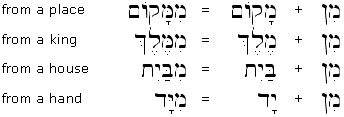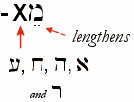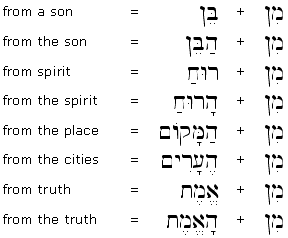|
The Preposition Min
The preposition min ("from," "out of") is perhaps the most versatile of the Hebrew prepositions, appearing both as an independent preposition and as an inseparable preposition. In addition, min is used to form comparative, superlative, and "partitive" grammatical constructions.
As an Independent Preposition
In Unit 7.2 you learned that the preposition min can stand alone as an independent
(or maqqef) preposition in a prepositional phrase. For example:

In this case, min occurs directly before its object and is simply translated "off the page" as "from," or "out of" (note that before definite nouns, min is usually joined to its object with a maqqef).
As an Inseparable Preposition
Like the other inseparable prepositions you studied in Unit 7.3, the letter Mem can function as a prefix to Hebrew words. For example, the word melekh simply means "king," but the word mimelekh means "from a king" (note again how the prefix immediately renders the noun as the object of the preposition).
Sometimes the vowel under the Mem prefix will change, depending on the consonant that appears at the beginning of the word; however, the rules for the vowel changes are really pretty simple:
CASE 1: The Basic Form
The inseparable form of the preposition min is actually a contraction of sorts. When min is added to a word, the Nun drops off and the first letter of the following word takes a dagesh (if possible):

For example:

In each of these cases, min is added to the word, but the Nun drops off and becomes a Dagesh in the first letter of the original word (the dagesh appears to "compensate" for the loss of the Nun (note that in the third example, the dagesh in Bet changes from Lene to Forte).
CASE 2: Before Guttural Letters
When min is added to a word that begins with a guttural letter (or the letter Resh), the Nun drops off, but, since a guttural cannot take a dagesh, and the Mem prefix vowel is lengthened (from Chireq to Tsere) to compensate:

Here are some examples:

Note that in some cases when min is added to a noun that begins with Chet, the Dagesh Forte is rejected but the vowel is not lengthened:

Before the Definite Article
When min is added to a definite noun, the Hey prefix is not dropped (as it is with the other inseparable prepositions), and the Mem prefix vowel is lengthened:

Since Hey is a guttural letter, this change is what you would expect, given the rule listed above.
The Comparative Use of Min
As you have already studied in Unit 5.6, comparisons are formed by adding min to the word that acts as the object of the comparison (i.e., the thing being compared to).
Example 1:

Literally this sentence reads: "The house is big from the tent" (the tent is the object of comparison or the thing being compared to). To use proper English, we would say "The house is bigger than the tent." Notice that the adjective gadol changes in meaning from "big" to "bigger" by means of this construction.
Tip: When min is used this way, think of it as "than" regarding the word that follows it. "The house is big(ger) than the tent."
Example 2:

Literally this sentence reads "Wisdom is good from gold." Using proper English would render this as "Wisdom is better than gold." Again, notice that the adjective tov changes in meaning from "good" to "better" by means of this construction.
Example 3:

In this sentence, the Mem prefix attaches to the object of comparison, wine. "Good than wine is wisdom," or "Better than wine is wisdom" (notice the shift in word order here, which is common in Hebrew).
The Superlative Use of Min
Recall from Unit 5.6 that the superlative form of an adjective can also be constructed using the preposition min.
Example:

Literally this sentence reads, "Samuel (is) the great from the men," but we render it as "Samuel is the greatest of the men" to form a better English construction.
The Partitive Use of Min
Min can also be used to express that its object is a part of something. Context is the key to determining this usage of the preposition.
Example:

Depending on the context, this could mean "some of the fruit," or a part of the fruit, etc. The partitive use of min will be studied later using explicit examples from the Tanach.
Section Exercises
- Memorize the section vocabulary (top of the page)
- Determine the result of adding the Mem prefix to the nouns:

- Using your lexicon (and vocabulary you already know), append the Mem prefix to both definite and indefinite nouns.
- Summarize the different uses of the Mem prefix on a flash card and provide examples from the Tanach.
<< Return
|



